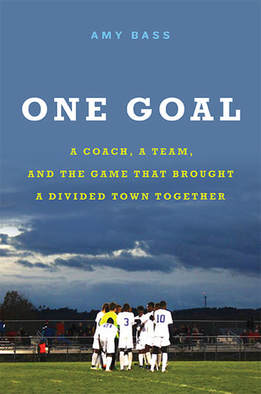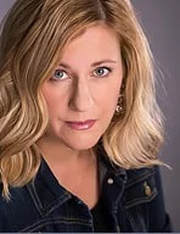
It is a rare book that, in a literal sense, grabs you by the shoulders and shakes you. As the United States grapples with a polarized atmosphere of distrust, with immigration remaining a hot-button issue, Amy Bass has provided a valuable wake-up call that shakes you to the core.
Bass’ fourth book, One Goal: A Coach, A Team, and the Game that Brought a Divided Town Together (Hachette Books; hardback; $28; 304 pages), views a high school soccer team from Maine through cultural and social lenses.
Bass writes about the Lewiston High School boys’ squad, a roster filled with players of Somali descent. The Blue Devils’ pursuit of a state championship in 2015 is a central theme, but it is merely a foundation for the more interesting subplots that took place in a predominantly white community that struggled to accept an eastern African culture.
This is the fourth book for Bass, who is director of the honors program and a professor of history at the College of New Rochelle in suburban New York City. In One Goal, she has combined a trained historian’s eye for detail and a journalist’s inquisitiveness to uncover a compelling story. Journalism is part of Bass’ DNA; her father, Milton Bass, was a columnist for 60 years at the Berkshire Eagle in Massachusetts. Her mother, Ruth Haskins Bass, also worked at the Berkshire Eagle as a police reporter and building editor.
Bass’ scholarly interests include African-American history and modern American culture with an emphasis on sports. She received her undergraduate degree at Bates College in Lewiston, so she is familiar with the dynamic of the city. Lewiston, once a bustling mill town during the Industrial Revolution, had fallen upon bad times. Its only claim to fame over the past half century had been as the venue for the heavyweight boxing title rematch between Muhammad Ali and Sonny Liston, a 1965 fight that smelled of a fix when Liston lost via a “phantom punch” in the first round.
 "One Goal" is Amy Bass' fourth book.
"One Goal" is Amy Bass' fourth book. In 2002 the mayor of Lewiston wrote a “Maxed-Out letter,” suggesting there were enough Somalis in town. But when a white supremacist group staged a rally in Lewiston a few months later, residents rallied and united against the hatred. It was a much-needed breakthrough, although even as late as 2012, a different mayor of Lewiston told the BBC in an interview that he wished the Somalis would “leave their culture at the door.”
Schools and athletics would become the catalyst and a much-needed balm to ease tensions. Bass writes that the schools in Lewiston “became the front line” for the transitions taking place. Lewiston was a place where Somalis could live peacefully, far away from the turmoil and carnage in their home country. To this day, that holds true; on Feb. 23 of this year, at least 18 people were killed as explosions rocked Somalia’s capital city of Mogadishu.
Longtime Lewiston High School soccer coach Mike McGraw saw the potential in the young Somalis playing pickup games in the city. Molding the group into a cohesive unit, McGraw and his squad weathered racial taunts to bring an elusive soccer state championship to a school nestled in a traditionally hockey-mad area.
It wasn’t easy. There had to be trust between the coaching staff and players, but McGraw, a crusty traditionalist who played by the rules and was a stickler for details, showed his ability to adapt and use some inventive schemes to take advantage of his players’ speed and strength. He also had to make allowances for Muslim holidays, prayer sessions and fasting (which sometimes took place before matches). And, as the players have joked, McGraw doesn’t care where his players come from, “as long as they pass the ball.”
McGraw was able to achieve success because of a hard-working, diligent group of assistants (Dan Gish, Abdijabar Herst. and Per Henrikson), supportive school staff (Athletic Director Jason Fuller and Principal Shawn Chabot), and community members like Denis and Kathy Wing, along with other members of the school’s booster club.
On the field, the players followed the lead of their parents who pulled together to help each other in their new community, adhering to the idea of Ilko wada jir bey wax ku gooyan — together, the teeth can cut. The team’s slogan of pamoja ndugu — “together brothers” — cut across racial, social and cultural lines and transformed groups of individuals into a team.
“Home” is a big part of One Goal, too. In a piece she wrote on her blog on Christmas Eve 2017, Bass noted that in her book, the word “home” appeared at least once on 69 different pages. Home games, road games, homes left behind or burned to the ground, she writes. Homes where people are welcome, and homes where people live in fear.
All those ideas are ably communicated in One Goal. While the history is interesting, and the social and cultural implications are fascinating, there is the cohesiveness of the story — and Bass is a fine storyteller. She resorts to play by play only when necessary, building the drama as the Blue Devils advance toward a state title that barely eluded them in 2014. In 2015, that goal would be reached in dramatic fashion, and a community celebrated together as brothers and sisters.
The rise of the Lewiston soccer team, Bass writes, shows what happens “when America works the way it is supposed to; the way it reads on paper.” The idea of building a wall to deter immigrants, an idea that helped propel Donald Trump to the presidency in 2016, pales in comparison to what a soccer team in “one of the whitest states in America” achieved. Rather than building a wall, the Blue Devils soccer team helped tear down racial barriers, even if only temporarily.
Bass shows how trust, faith, hard work and some uncanny soccer ability helped bring glory and pride to a town that still struggles with coexistence between very different cultures.
More importantly, she demonstrates that in the United States, you don’t have to live like a refugee.
 RSS Feed
RSS Feed
